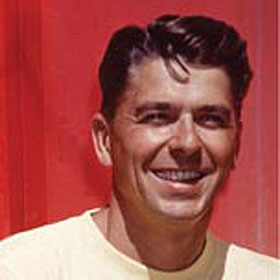My Father At 100 By Ron Reagan

2.5/5
Is My Father at 100 a sensationalist commentary by an opportunistic son? Unfortunately not. Such a text would have been a lot more gripping. Instead, this book by the son of former President Ronald Reagan, intended to commemorate the centennial year of his father's birth, reads more like the author's journal. That is, it's a collection of notes, ramblings and opinions that are important to himself, but that to anyone else just sound really self-absorbed.
Ron's intention with My Father at 100, the first book he's ever written, does not seek to take a political position or to reveal any large secrets from the Reagan family history or the Reagan administration. Rather, it is Ron's record of his quest to unveil the "Hidden Ten Percent" of his father, the part of his dad that he never understood and that his other siblings have labeled as "absent" and "distant." In order to penetrate the mysterious tenth of his father's personality, Ron delves into his family genealogy, looks through old family photos, and visits the small town in Illinois where his father was born.
Under most circumstances, this sort of journey would have been incredibly daunting. Fortunately for Ron, whose family history has been given a lot of attention by historians and Ronald Reagan fanatics, his trip included a mere visit to the Ronald Reagan Presidential Foundation and Library in California and a flight to the home in Tampico, Illinois where his dad was born. Conveniently, all of the photos and family memorabilia at the RRPF and Library were labeled and dated, and his father's childhood apartment had been converted into a mini Ronald Reagan museum.
Ron's first one or two chapters are appealing because they recount a brief history of Ireland and the Potato Famine. About forty pages into the 200-hundred of his novel, however, Ron veers into the realm of self-import, and spends the remainder of his pages boasting about himself and his, "buoyant and event-tempered," "dignified and resolute," "astonishingly good-looking, extremely photogenic" father. I nearly stuffed the book into my garbage disposal after reading that young Ron was so incredibly fit that he once beat his athletically-gifted father in a swimming race in the pool in their backyard, and that he was so exceedingly brilliant that he sometimes made his father "feel stupid."
I made it through to the end with my "annoying content" radar on to learn that Ron believes his father's foibles can all be explained by the opinion that his dad should have been born in the 19th century. Good work, DCS Reagan.
To further convince readers to stay clear of this book, see Ron Reagan's recent appearance on The Colbert Report: Ron had been invited on the show to promote this book via an interview with the show's host. Colbert, a political comedian, asks Ron what is was like to "sit at the kitchen table and eat dinner with his dad." Ron replies uber-snootily that he and his family did not sit at the kitchen table, but that "we dined, we ate ate in the dining room." That's pretty much the snobby and irritating voice with which Ron writes.
All things said, Ron Reagan does writes quite well. I'd try reading him again, so long as he steers clear of self-reflection.
RELATED ARTICLES
Get the most-revealing celebrity conversations with the uInterview podcast!







Leave a comment